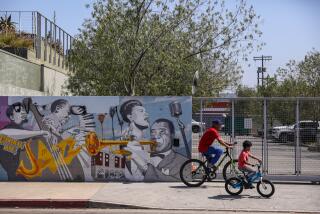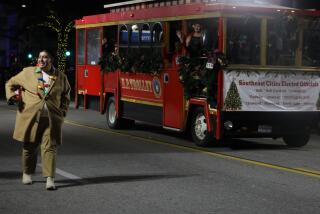A Matter Not of Race, but of Right and Wrong
- Share via
I found out quickly that Don Lopez is different when I telephoned the other day. It was the way he answered the phone: “Racist’s residence.”
Lopez says it was his own stab at humor because of all the abuse he’s been taking lately. You see, he is vehemently opposed to the presence of Spanish-speaking day laborers looking for work in his neighborhood in Ladera Heights.
He and others in the comfortable, mostly African American neighborhood say the men--immigrants who station themselves at the parking lot entrances to a HomeBase store--are a blight and a danger to the area. At times, the residents say, the laborers urinate on their lawns, make lewd comments to residents and make some parents fear for their children’s safety.
The grandson of Mexican immigrants who is fluent in Spanish, Lopez shakes his head at being called a racist by the laborers, little old ladies and others.
“How does that happen?” Lopez, 39, asks. “Explain it to me. I’m no racist.”
*
Initially, I was drawn to the squabble in Ladera Heights because it’s another sign of tensions between the city’s two largest minority groups--Latinos and blacks. Latino politicians and community leaders say it is the thorniest issue that faces them as they try to make sense of post-riot L.A.
County Supervisor Yvonne Brathwaite Burke, who is black, seemed to be aware of it as she chose her words carefully last week in talking about her compromise ordinance to defuse the day laborer controversy. She said race doesn’t play a role in the dispute and cited Lopez’s opposition to the day laborers as proof that it isn’t just a black vs. brown thing.
When I called Lopez and heard his “racist” greeting, I knew he was one man I had to meet.
When we did at his South-Central auto remanufacturing shop, which sells and exports rebuilt auto parts, he proudly told me how his parents, Margarita and Gustavo Lopez, began the business in the 1950s and eventually turned it over to him and an older sister, Carolyn.
“I didn’t inherit this business,” he says. “I bought it from them.”
The problem with the day laborers in Ladera Heights has worsened in the last three years, says Lopez, who has lived in a corner home on Slauson Avenue for more than 17 years.
The men crowd sidewalks and yards, block traffic and are disrespectful to residents. He has talked to them repeatedly about such conduct but says it does no good.
“I’m not opposed to people waiting for the bus or waiting for a ride,” he says. “That’s life. But I do mind having an employment line in front of my house.”
He has gone to meetings with immigrant advocates and others in recent months to try and find a solution but came away frustrated.
He says it is wrong for laborers to be out on the streets asking for work and for their advocates to fight for their right to do so. Organizations such as the ACLU would be better served if they helped organize the men so that they can meet at an office or building, obtain decent-paying jobs and avoid exploitation from conniving employers.
“It’s not a matter of gender,” he says, “or of race. It’s a matter of good and bad. . . . There’s right and there’s wrong, and what these people are doing is wrong.”
As I’m listening, I’m trying to keep in check my own sympathies. I feel for immigrants because of my own family’s history of coming to L.A. from Mexico. It’s an experience many share. If a Latino is critical of that experience, some might suggest that person is rejecting that history.
Some might even call that person a racist.
“Your father who came from Mexico,” he asks, “did he teach you to urinate on people’s lawns?”
“No,” I reply.
“Did he teach you to stand on a corner and ask for work?”
“It didn’t come to that. But what if it’s the only way to find work, no matter how wrong you think it is? What if it’s the only way?”
After a pause, he remarks, “It’s still wrong. I’m not saying you should conform or get out. We all have to live in society. There’s a right way to do it.”
*
I don’t think Lopez is a racist. He’s proud of his Mexican roots. And his commitment to keep his business in South-Central, where all of his workers are minorities, says a lot about him.
But I don’t agree with him. You just can’t be closed-minded about banning job-seekers because of the acts of a few bad apples. The men come there because the demand for them seems to be there. Since he does speak Spanish, Lopez can help find a solution if he chooses to.
My dad said, “Find a job, work hard and people will respect you.” I’m sure Lopez’s parents told him the same thing.
More to Read
Sign up for Essential California
The most important California stories and recommendations in your inbox every morning.
You may occasionally receive promotional content from the Los Angeles Times.













